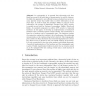242 search results - page 39 / 49 » Randomness in Cryptography |
EUROPKI
2007
Springer
15 years 5 months ago
2007
Springer
Time Capsule Signature, first formalized by Dodis and Yum in Financial Cryptography 2005, is a digital signature scheme which allows a signature to bear a (future) time t so that t...
109
click to vote
FOCS
2009
IEEE
15 years 5 months ago
2009
IEEE
Coin flipping is a fundamental cryptographic primitive that enables two distrustful and far apart parties to create a uniformly random bit [Blu81]. Quantum information allows for ...
129
click to vote
CHES
2006
Springer
15 years 5 months ago
2006
Springer
In cryptography it is assumed that adversaries only have black box access to the secret keys of honest parties. In real life, however, the black box approach is not sufficient beca...
127
click to vote
FOCS
2004
IEEE
15 years 5 months ago
2004
IEEE
Let p > 1 be any fixed real. We show that assuming NP RP, there is no polynomial time algorithm that approximates the Shortest Vector Problem (SVP) in p norm within a constant ...
116
click to vote
CISC
2008
Springer
15 years 4 months ago
2008
Springer
Anonymity is one of the main concerns in group-oriented cryptography. However, most efforts, for instance, group signatures and ring signatures, are only made to provide anonymity ...

